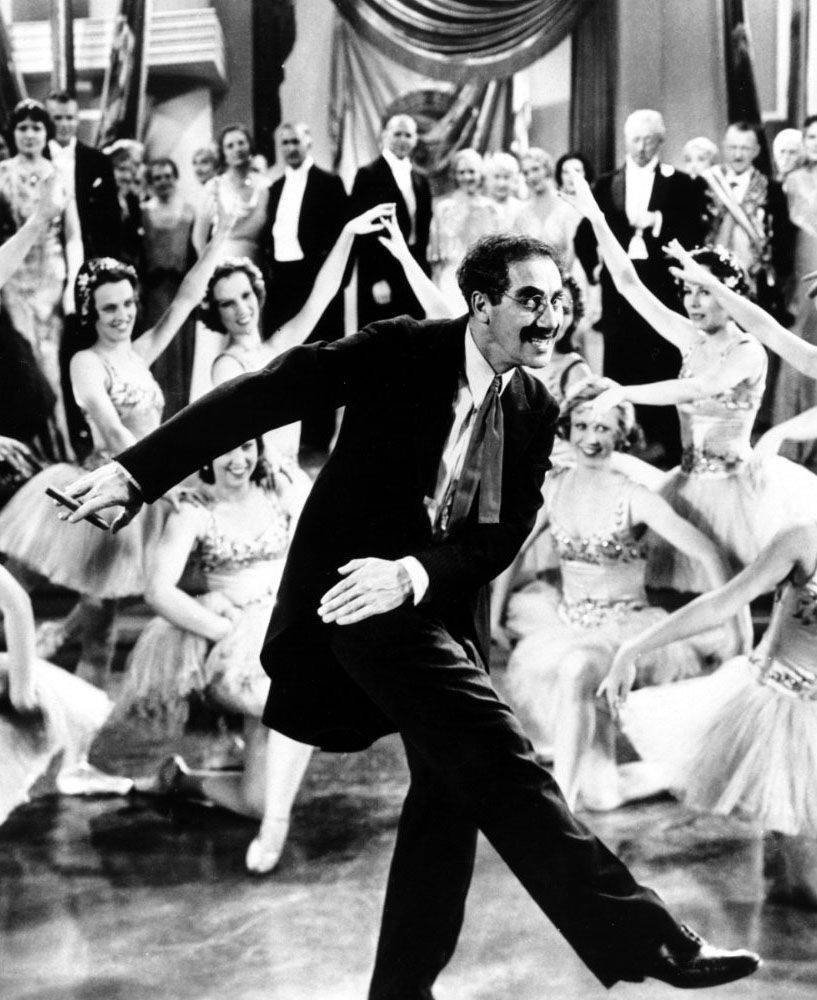Classic Comedy Dialogue
Marx Brothers fans usually fall into two camps: those who think Duck Soup (1933) is their best film, and those who think A Night at the Opera (1935) is their best film. The strongest argument in favor of A Night at the Opera is the stateroom scene. It’s the funniest sequence the Marx Brothers ever created. I’m in the Duck Soup camp. I think the slow portions of A Night at the Opera tend to drag it down a bit. And while no single sequence in Duck Soup quite matches the stateroom scene, it’s more consistently entertaining.
Much of the credit has to go to Duck Soup’s writers. Bert Kalmar and Harry Ruby worked together on the story, and Arthur Sheekman and Nat Perrin provided additional dialogue. It also didn’t hurt to have Groucho (Rufus T. Firefly), Chico (Chicolini), and Margaret Dumont (Mrs. Teasdale) to deliver the lines. Here are some examples:
Rufus T. Firefly: Not that I care, but where is your husband?
Mrs. Teasdale: Why, he’s dead.
Rufus T. Firefly: I bet he’s just using that as an excuse.
Mrs. Teasdale: I was with him to the very end.
Rufus T. Firefly: No wonder he passed away.
Mrs. Teasdale: I held him in my arms and kissed him.
Rufus T. Firefly: Oh, I see, then it was murder. Will you marry me? Did he leave you any money? Answer the second question first.
Mrs. Teasdale: Notables from every country are gathered here in your honor. This is a gala day for you.
Rufus T. Firefly: Well, a gal a day is enough for me. I don’t think I could handle any more.
Rufus T. Firefly: Now, what is it that has four pairs of pants, lives in Philadelphia, and it never rains but it pours?
Chicolini: Atsa good one. I give you three guesses.
Rufus T. Firefly: Now let me see. Has four pair of pants, lives in Philadelphia… Is it male or female?
Chicolini: No, I no think so.
Rufus T. Firefly: Is he dead?
Chicolini: Who?
Rufus T. Firefly: I don’t know. I give up.
Chicolini: I give up, too.
Prosecutor: Chicolini, when were you born?
Chicolini: I don’t-a remember. I was just a little baby.
Prosecutor: Something must be done! War would mean a prohibitive increase in our taxes.
Chicolini: Hey, I got an uncle lives in Taxes.
Prosecutor: No, I’m talking about taxes — money, dollars!
Chicolini: Dollars! There’s-a where my uncle lives! Dollars, Taxes!
Duck Soup benefits by having a first-class director at the helm. Leo McCarey had directed many of the best Laurel and Hardy silent comedies. His previous sound comedies, especially Let’s Go Native (1930) and The Kid from Spain (1932), show an inventive and improvisational style that would blend well with the Marx Brothers. Unfortunately, Duck Soup was a flop at the box office. As a result, it was their last film at Paramount. MGM gave them another chance, though their freewheeling approach would prove to be at odds with the MGM factory system. Their comedies following A Night at the Opera and A Day at the Races are pale imitations of their earlier classic films.
Duck Soup
(1933; directed by Leo McCarey)
Universal Pictures Home Entertainment (Blu-ray and DVD)
Saturday, May 10 at 12:15 a.m. eastern (late Fri. night) on Turner Classic Movies
Reviews